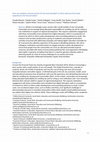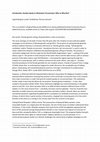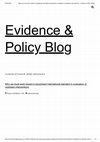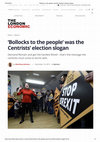Papers by Matthew T Johnson

Journal of Widening Participation and Lifelong Learning, 2023
Britain is increasingly a poor country with a small number of very rich people. Universities are ... more Britain is increasingly a poor country with a small number of very rich people. Universities are increasingly being allocated responsibility for Levelling Up and for acting as civic institutions in support of regional development. This requires substantive engagement with those communities most excluded from Higher Education, both in co-production of research by which to inform policy development and in providing pathways to study. This research note has been produced by a group of academics and outreach professions centrally concerned with addressing inequality and making Higher Education reachable for all. It presents the collective experience of the group in identifying obstacles. We call on colleagues, institutions and policymakers to engage seriously in policy development to ensure that people from the communities we serve are allocated essential material resources, provided with means of overcoming spatial barriers and supported in developing seed capital. In general, we believe that there is a need for genuine collective action in advancing equity at a time of serious challenges to our society and sector.
British Academy Review, 2016
With the election in May 2015 of the first Conservative majority Government since 1992, attention... more With the election in May 2015 of the first Conservative majority Government since 1992, attention is firmly fixed on new rounds of austerity. Gone are the references to the ‘well-being agenda’ and claims of social progress being devolved to civil society through ‘Big Society’. The Government’s ideological commitment to a stripping back of the state, the fetishisation of certain forms of life, and the reluctance to uphold and promote broader social goods, have highlighted the need for a more thorough examination of the value of grounding public policy in ‘good culture’.

Objective Universal Basic Income(UBI)-a largely unconditional, regular payment to all adults to s... more Objective Universal Basic Income(UBI)-a largely unconditional, regular payment to all adults to support basic needs-has been proposed as a policy to increase the size and security of household incomes and promote mental health. We aimed to quantify its long-term impact on mental health among young people in England. Method We produced a discrete-time dynamic stochastic microsimulation that models a close-to-reality open cohort of synthetic individuals (2010-2030) based on data from Office for National Statistics and Understanding Society. Three UBI scheme scenarios were simulated: Scheme 1-Starter (per week): £41 per child; £63 per adult over 18 and under 65; £190 per adult aged 65+; Scheme 2-Intermediate (per week): £63 per child; £145 per adult under 65; £190 per adult aged 65+; Scheme 3-Minimum Income Standard level (per week): £95 per child; £230 per adult under 65; £230 per adult aged 65+. We reported cases of anxiety and depression prevented or postponed and cost savings. Estimates are rounded to the 2 nd significant digit. Results Scheme 1 could prevent or postpone 200,000(95% uncertainty interval: 180,000-210,000) cases of anxiety and depression from 2010-2030. This would increase to 420,000(400,000-440,000) for Scheme 2 and 550,000(520,000-570,000) for Scheme 3. Assuming that 50% of cases are diagnosed and treated, Scheme 1 could save £330m(£280m-£390m) to NHS and personal social services (PSS), over the same period, with Scheme 2(£710 million[£640m-£790m]) or Scheme 3(£930 million[£850m-£1000m]) producing more considerable savings. Overall, total cost savings (including NHS, PSS and patients' related costs) would range from £1.5 billion (£1.2b-£1.8b) for Scheme 1 to £4.2 billion (£3.7b-£4.6b) for Scheme 3. Conclusion Our modelling suggests that UBI could substantially benefit young people's mental health, producing substantial health-related cost savings.
Encyclopedia of Quality of Life and Well-Being Research, 2022
Cultural evaluation denotes the assessment of the value of culture according to a potentially inf... more Cultural evaluation denotes the assessment of the value of culture according to a potentially infinite range of rubrics. The term does not inherently require reliance upon perfectionist or good-based criteria and may be grounded in deontological conceptions of rights and justice. It may often be associated with assessment across or between groups and societies.
Levelling the mental health gradient among young people: How Universal Basic Income can address the crisis in anxiety and depression, 2022
This work was funded by the Wellcome Trust as part of a project entitled Assessing the prospectiv... more This work was funded by the Wellcome Trust as part of a project entitled Assessing the prospective impacts of Universal Basic Income (UBI) on anxiety and depression among 14-24-year-olds. This serves as a pilot study for our much broader, long-term examination of the role of Universal Basic Income as a public health measure.
The project commenced in August 2021 and has led to a number of articles either published or under review and two reports published by Compass. This publication serves as an interim report summarising findings to date in advance of the end of project RSA report, which will be launched in September 2022.

Global Discourse, 2022
Taking Richard Shweder’s (2021) article ‘The prosecution of Dawoodi Bohra women: some reasonable ... more Taking Richard Shweder’s (2021) article ‘The prosecution of Dawoodi Bohra women: some reasonable doubts’ as a target piece for discussion, the aim of this issue is to better understand these limitations. In the article, Shweder proposes that some forms of FGC be legalized, arguing that the form of FGC practiced among Dawoodi Bohra Muslims is less invasive than typical circumcision of boys and that, among the Bohra, FGC is a religiously meaningful ritual. This proposal implies that girls should have the same rights to cultural and/or religious identity as circumcised boys. It is a controversial proposal insofar as it directly challenges the central tenet of global campaigns to end FGC, such as target 5.3 in the United Nations Sustainable Development Goal: that girls can only be empowered by protecting them from being subjected to a fear-inducing and painful experience.
This issue examines both directions within the equivalence argument: the plausibility of legalization of FGC, but also the possibility that boys require protection from forms of male genital cutting. This second possibility – of proposing an age limit or ban on boy circumcision – is also controversial, particularly at a time in which there is growing concern about anti-Semitism and Islamophobia. This may, in part, explain worldwide reluctance by otherwise interventionist policy makers to act upon the similarities of boy and girl circumcision.

UK Election Analysis 2017: UK Election Analysis: Media, Voters and the Campaign Early reflections from leading academics, 2017
For much of 2010-2015, I ran a participatory project involving community co-researchers from Ashi... more For much of 2010-2015, I ran a participatory project involving community co-researchers from Ashington, Northumberland. The project traced the ways the dissolution of institutions through neoliberalism was inflicting on once functioning communities avoidable harm, despite valiant efforts of community members. Nationalized industry had provided subsistence and purpose had been dissolved; community institutions, Unions and social clubs had provided formal welfare and community cohesion, were demeaned and devalued. The consequences were appalling: successive generations gradually becoming more dysfunctional as institutions disappeared. The key finding was clear: people need specific institutions
and neoliberalism cannot provide them. This election supported that finding in important ways.

Lancaster University Blogs, 2015
The post-Election petition (https://www.change.org/p/theukgovernmentallowthenorthofenglandtoseced... more The post-Election petition (https://www.change.org/p/theukgovernmentallowthenorthofenglandtosecedefromtheukandjoinscotland) to allow the North of England to secede from the UK and join a 'New Scotland' highlights the deep alienation of the North from the centre of power in London, but also the problematic nature of Englishness and 'English' interests propounded by UKIP and The Conservative Party. In effect, some in the North struggle to identify with a country (England) surrounding a supposed nation (the English) with which they are identified by the UK state, but which they increasingly see as less viable than a potential independent state (Scotland) surrounding a supposed nation (the Scots) with which they do not centrally identify. Over the past three years, confusion about identification with nations and states has been examined in a participatory project (http://wp.lancs.ac.uk/goodculture/) involving people from a range of backgrounds in two groups which are increasingly alienated from their respective states: people from Ashington, Northumberland, which has seen its traditional source of livelihood decline in the wake of the dissolution of the mining industry, and people from Aboriginal Australian communities around Brisbane, which have seen their traditional lives destroyed during colonialism.
British Academy Review, 2016
With the election in May 2015 of the first Conservative majority Government since 1992, attention... more With the election in May 2015 of the first Conservative majority Government since 1992, attention is firmly fixed on new rounds of austerity. Gone are the references to the ‘well-being agenda’ and claims of social progress being devolved to civil society through ‘Big Society’. The Government’s ideological commitment to a stripping back of the state, the fetishisation of certain forms of life, and the reluctance to uphold and promote broader social goods, have highlighted the need for a more thorough examination of the value of grounding public policy in ‘good culture’.
ESRC: Society Now, 2016
OVER THE PAST three years, the concept of the nation state and the shared, cultural understanding... more OVER THE PAST three years, the concept of the nation state and the shared, cultural understandings which underpin it, have been examined in a participatory project involving people from two groups which are increasingly alienated from their respective states: people from Ashington, Northumberland, which has seen its traditional source of livelihood decline in the wake of the dissolution of the mining industry; and people from Aboriginal Australian communities around Brisbane, which have seen their traditional lives destroyed during colonialism.

Evidence & Policy Blog: A journal of research, debate and practice, 2021
The COVID-19 pandemic has increased interest in Universal Basic Income (UBI) as a means of addres... more The COVID-19 pandemic has increased interest in Universal Basic Income (UBI) as a means of addressing a range of socio-economic insecurities. While previous trials of cash transfer schemes have often focused on low-level transfers inadequate to satisfy the needs for which the policy was originally developed, emerging pilots are moving toward a position of increasing generosity. Our multidisciplinary project, Examining the Health Case for UBI, has brought together colleagues in behavioural science, public health, epidemiology and economics to establish pathways to health impact outlined in Figure 1 below. Our work suggests the potential for significant health impact and attendant economic benefit via reduced healthcare costs and increased economic activity. The model suggests that elements of impact may only be felt if payment is set at a more generous level. This could create greater return on investment and, ironically, a more cost-effective system.
Foreign Affairs, 2015
The United Kingdom’s electorate is headed to the polls after the country’s coalition government m... more The United Kingdom’s electorate is headed to the polls after the country’s coalition government missed most of its targets for deficit and debt reduction, managing only to provide a return to prosperity for London and southeast England. Disparate portions of the country, once held together by collective achievements such as the National Health Service (NHS), nationalized industries, and the welfare state, are drifting. Nationalist parties such as the Scottish Nationalist Party (SNP), Plaid Cymru, and the UK Independence Party (UKIP) are rushing to capitalize on the change in ways which are only now becoming apparent. British and, perhaps surprisingly, English identity is at stake.
The Conversation, 2014
Police and border officials have been running a campaign at airports across the UK to intercept f... more Police and border officials have been running a campaign at airports across the UK to intercept families who could have taken their children abroad for female genital mutilation (FGM). Now the Metropolitan police chief has said medical examinations to identify FGM victims may have to be considered. Dominating the campaign to end FGM has been a “barbarism” discourse grounded in the belief that FGM is a uniquely pernicious cultural practice. While it is important that we attempt to protect vulnerable people and challenge practices like FGM, we need to avoid simplistic, shrill rhetoric which may undermine those efforts.
British Academy Review, 2016
With the election in May 2015 of the first Conservative majority Government since 1992, attention... more With the election in May 2015 of the first Conservative majority Government since 1992, attention is firmly fixed on new rounds of austerity. Gone are the references to the ‘well-being agenda’ and claims of social progress being devolved to civil society through ‘Big Society’. The Government’s ideological commitment to a stripping back of the state, the fetishisation of certain forms of life, and the reluctance to uphold and promote broader social goods, have highlighted the need for a more thorough examination of the value of grounding public policy in ‘good culture’.
Journal of Medical Ethics Blog, 2016
David Cameron’s declaration that there will be ‘no more’ passive tolerance of Female Genital Muti... more David Cameron’s declaration that there will be ‘no more’ passive tolerance of Female Genital Mutilation (FGM) comes against the backdrop of the revelation that 1,000 cases of FGM had been recorded in three months this year as part of NHS data collection on the practice. This data collection commenced in April as part of the Government’s eradication drive, and its findings demonstrate the seriousness of the practice. One natural response to the problem is, as Cameron suggests, to call for sterner punishments for practitioners and, indeed, parents who inflict the practice. However, if our concern is to prevent harm, there are many reasons to reject that route and indeed precedents in our treatment of other (different) harmful practices which highlight the deficits in the approach.
The Conversation, 2016
For the past two years, two apparently unconnected groups have been working together to develop c... more For the past two years, two apparently unconnected groups have been working together to develop cultural resources to help deal with difficult socioeconomic circumstances. The groups, from Ashington, Northumberland, and various Aboriginal communities around Brisbane, Australia, have very different histories, traditions and environments, separated as they are by thousands of miles and years of human history. Members of the Ashington group have visited their Aboriginal counterparts for a month-long exchange, during which they shadowed their hosts, examined their circumstances and engaged in a discussion about advancing collective interests.
The Conversation, 2014
Police and border officials have been running a campaign at airports across the UK to intercept f... more Police and border officials have been running a campaign at airports across the UK to intercept families who could have taken their children abroad for female genital mutilation (FGM). Now the Metropolitan police chief has said medical examinations to identify FGM victims may have to be considered. Dominating the campaign to end FGM has been a “barbarism” discourse grounded in the belief that FGM is a uniquely pernicious cultural practice. While it is important that we attempt to protect vulnerable people and challenge practices like FGM, we need to avoid simplistic, shrill rhetoric which may undermine those efforts.
Pulse, 2018
A universal basic income could alleviate GPs’ gatekeeping role in access to welfare benefits, fre... more A universal basic income could alleviate GPs’ gatekeeping role in access to welfare benefits, freeing them up to do their real job of caring for patients,

London Economic, 2019
For the last three years, ‘Centrists’ have campaigned relentlessly against the Labour Party leade... more For the last three years, ‘Centrists’ have campaigned relentlessly against the Labour Party leadership on the basis of Brexit. Woke Labour Centrists, their Lib Dem (and even some Conservative) allies as well as the ‘liberal’ media, made a case for Remain that had already been rejected in 2016 and 2017. Beyond the centrist echo chamber in constituencies Labour needed to hold on to or win, there was palpable anger about the contempt in which voters were being held. It is no coincidence that the central figure in this campaign, Tom Watson, chose not to stand again. He knew where this was headed. Leave voters and Remain-voters who respected democratic decision making were told they were thick, brainwashed, racist and self-defeating. The only reason given to change their minds was that their lives would get worse by leaving the EU. After 40 years of decline while in the EU, many people just could not see how their lives could possibly get any worse. People have been called racist, xenophobic and bigoted for worrying about the effects of migration on communities that were worst equipped (and funded) to manage it. This wasn’t just ill-conceived, it was downright offensive. A negative effect on salaries of the lowest paid was glossed over as insignificant. Maybe it was, maybe it wasn’t, but you don’t win people over by telling them they’re stupid.
LabourList, 2018
John McDonnell has announced that Labour may include a trial of Universal Basic Income (UBI) in t... more John McDonnell has announced that Labour may include a trial of Universal Basic Income (UBI) in the next Labour Party Manifesto. UBI – state provision of unconditional monthly stipends to all adult citizens – has been justified on myriad grounds: citizenship, welfare reform, growth. However, its biggest and, as yet, unexplored contribution may be to physical health and it is essential that any trial is able to measure that effect in very specific ways.

Uploads
Papers by Matthew T Johnson
The project commenced in August 2021 and has led to a number of articles either published or under review and two reports published by Compass. This publication serves as an interim report summarising findings to date in advance of the end of project RSA report, which will be launched in September 2022.
This issue examines both directions within the equivalence argument: the plausibility of legalization of FGC, but also the possibility that boys require protection from forms of male genital cutting. This second possibility – of proposing an age limit or ban on boy circumcision – is also controversial, particularly at a time in which there is growing concern about anti-Semitism and Islamophobia. This may, in part, explain worldwide reluctance by otherwise interventionist policy makers to act upon the similarities of boy and girl circumcision.
and neoliberalism cannot provide them. This election supported that finding in important ways.
The project commenced in August 2021 and has led to a number of articles either published or under review and two reports published by Compass. This publication serves as an interim report summarising findings to date in advance of the end of project RSA report, which will be launched in September 2022.
This issue examines both directions within the equivalence argument: the plausibility of legalization of FGC, but also the possibility that boys require protection from forms of male genital cutting. This second possibility – of proposing an age limit or ban on boy circumcision – is also controversial, particularly at a time in which there is growing concern about anti-Semitism and Islamophobia. This may, in part, explain worldwide reluctance by otherwise interventionist policy makers to act upon the similarities of boy and girl circumcision.
and neoliberalism cannot provide them. This election supported that finding in important ways.
This research in a box contains teaching resources developed as part of Lancaster University’s Politics and International Relations programme of outreach and the work of The Richardson Institute, Britain’s oldest Peace and Conflict research centre. It uses the case of conflict involving ISIS in the Middle East to enable students to engage with the international issue of radicalisation, before considering local responses to extremism in a range of contexts.
The ‘box’ contains a series of electronic resources, including PowerPoint decks with embedded videos and PDF guides intended to enable teachers to run a university-style three week module on the subject. The materials are reliable, coherent resources which support active learning activities, including a role paly, capable of introducing students to core issues of relevance in studies of radicalisation.
The materials are hosted on Lancaster University’s designated Radicalisation Engagement Open Learning site: https://openlearning.lancs.ac.uk/course/view.php?id=165
The ‘box’ contains a series of electronic resources, including PowerPoint decks, associated videos and a PDF reading stimulus, intended to enable teachers to run a university-style five week module on the subject.
These workshops stimulate students to examine the part played by social, political and economic processes in the shaping of their family’s circumstances. This reflexive process is intended to assist students to understand the ways in which they may be disadvantaged by historical events and to consider means of dealing with disadvantage, particularly through participation in Higher Education.
The resources use stimulus video material taken from ‘A Cross-Cultural Working Group on “Good Culture” and Precariousness’, a project involving community participants from Ashington, Northumberland and Aboriginal communities around Brisbane, Australia. While these groups experience particular forms of disadvantage, their cases can help students consider their own circumstances.
The ‘box’ has an associated YouTube archive containing a range of relevant video content:
https://www.youtube.com/channel/UCFYnoCKbEDJAliUeJgBhQ1g/videos
These videos, which are searchable within the project channel, can be used by teachers to examine issues of disadvantage. Teachers can amend the PowerPoint slides to better fit the interests of their students or their learning objectives by substituting videos and revising text. All YouTube videos can be embedded using embed codes.
The materials are hosted on Lancaster University’s designated Rethinking Disadvantage Open Learning site:
https://openlearning.lancs.ac.uk/course/view.php?id=166
1) the background to, and motivations for, participatory research
2) implications that communities should consider when deciding whether or not to participate in projects and
3) key steps participants can take to minimize risks and maximize benefits.
This collection considers the apparent contradictions and complications of the contemporary status and deployment of the many forms of genital cutting, raising a serious, wide-reaching question: what scope should society have to impose physically invasive rites on people?